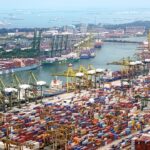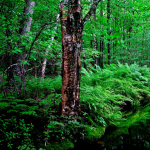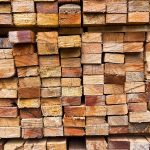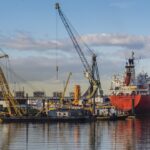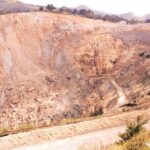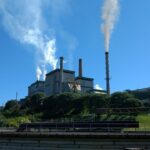
Malaysia has emerged as China’s fastest‑growing supplier of fibreboard, recording a remarkable 683% surge in shipments to 1,400 tonnes in the first nine months of 2025, according to new data from China Customs. The jump — the largest of any supplying country — comes as China’s total fibreboard imports rose 16% year‑on‑year to 45,000 tonnes – up to 50% of the world’s supply, signalling renewed demand from downstream manufacturers. New Zealand, Thailand, Germany, and Spain followed.
Vietnam remained China’s largest overseas market, with imports soaring 126% to 501,000 tonnes. Strong growth was also recorded in Saudi Arabia, Mexico, the United Arab Emirates, and Canada, each posting double‑digit increases. Exports to the United States and Nigeria softened, falling 9% and 1% respectively.
China’s wooden furniture sector, however, continues to face headwinds.
Export receipts fell 7% to US$16.69 billion in the first nine months of 2025, with shipments to the United States — China’s largest market — plunging 18% to US$4.24 billion. Despite the downturn, China maintained strong sales to other major destinations, exporting US$1.2 billion worth of wooden furniture to the United Kingdom and US$1.1 billion to Australia. Malaysia also remained a significant buyer, importing US$445 million worth of China‑made wooden furniture — an 18% increase year‑on‑year.
China’s wooden furniture imports also declined, falling 6% to US$461 million over the same period. Italy remained the largest supplier, accounting for 46% of China’s total imports, though shipments fell 9% to US$214 million. Declines were also recorded from Germany, Vietnam, and France. Whilst several smaller suppliers bucked the trend, with imports rising from Thailand, Slovakia, and Indonesia.
Amid global market volatility and climate challenges, Vietnam’s wood industry registered a historic threshold in 2025, with exports of timber and wood products exceeding US$17 billion for the first time, underscoring its role as a major export pillar of the national economy.
In 2025, exports of timber and wood products to the United States were estimated at US$9.46 billion, representing a year-on-year rise of 4.4% and accounting for approximately 55% of Vietnam’s total wood export value. Vietnam continues to hold its position as the largest supplier of wooden furniture to the US market.
In the first 11 months of 2025, wooden furniture exports reached US$9.434 billion, accounting for nearly 61% of the industry’s total export value. Several other product groups also recorded export turnover of US$1 billion or more each, including wood chips at US$2.22 billion; sawn wood, boards, and flooring at US$2.091 billion; and wood pellets at US$1.081 billion.
2025 presented unprecedented challenges for the industry. These included reciprocal tariff measures, anti-dumping and anti-subsidy investigations from the US, mounting pressure from the EU’s upcoming Anti-Deforestation Regulation (EUDR), as well as subsequent storms and floods at home that disrupted raw material supply chains and production.
Looking ahead to 2026, Nguyen Quoc Tri, Deputy Minister of Agriculture and Environment, said the forestry sector aims to maintain forest coverage at around 42%, achieve wood and forest product exports of roughly US$18.5 billion, and accelerate the development of large-timber forests. Key priorities include applying science and technology, advancing digital transformation, and strengthening trade promotion. Future efforts will also focus on diversifying export markets, reducing dependence on a small number of major markets, building the “Vietnamese Wood” brand, and expanding forest environmental services and the carbon market.
A forest watchdog is alleging illegal logging is taking place in one of Vancouver Island’s last remaining old-growth valleys.
That is, according to a new report, which reveals that even if the United States stopped exporting lumber abroad, it would still have a 7 per cent gap between supply and demand. As it stands, the United States accounts for 27 per cent of softwood lumber demand, according to the O’Kelly Acumen and Global Wood Trends report, but produces only about 20 per cent of global supply.
That gap, the authors write, has been filled by imports for decades: over the past 50 years, foreign shipments have supplied between roughly one‑quarter and one‑third of total U.S. consumption. Canada provides the bulk of those imports — approximately 80 per cent — and is projected to meet more than 22 per cent of the U.S.’s needs in 2025. When growing shipments from Europe are factored in, nearly 30 per cent of U.S. requirements will be met by foreign producers.
More than 25% of lumber used to build housing across the United States will now be subject to 45% direct and indirect tariffs and duties after Donald Trump slapped a 10% global tariff on all lumber imported into the United States.
The United States of America (US) has reported sharply lower imports of various tropical wood hardwood products in June this year as the Trump administration continued to roll out an ever-evolving policy of trade tariffs.
While imports from most major trading partners fell in June, year-to-date figures for the top traders are well ahead of last year. Imports from Indonesia, the leading supplier, were up 60 per cent from last year through June while imports from the number two supplier, Vietnam, were 36 per cent ahead of last year’s pace. Through the first half of the year, the total import volumes of hardwood plywood are up 20 per cent over 2024,” said ITTO report
Today, the U.S. Department of Commerce announced its final decision in the sixth administrative review of the countervailing duty order on softwood lumber from Canada. The US Department of Commerce announced the final tariff rate for non-selected companies, which applies to most Canadian companies, increased to 14.63 percent, up from 6.74 percent determined in the previous administrative review. Thus, duties on Canadian softwood lumber are now a combined rate of 35.19%.
More than 80% of the United States lumber imports came across it’s North American border, with more than 70% of softwood lumber used to build housing.
Illegal gold mining remains rampant in the Amazon rainforest despite government efforts to curb it, reveals new analyses of satellite data from 2023 to 2024. According to the report by Greenpeace Brazil, national action to combat this destructive activity is not delivering a decrease, but rather a shift in the Indigenous territories affected. While mining activities reduced in Yanomami, Munduruku and Kayapó land (down 7%, 57% and 31%), Sararé land saw a dramatic surge, with illegal mining up by 93%.
Researchers also uncovered discrepancies in gold trade data. According to the investigation, Swiss imports exceeded Brazil’s reported exports by 67% in 2022 and 62% in 2023 – suggesting significant irregularities. in 2024, the top three destinations for Brazilian gold exports were Canada, Switzerland, and the United Kingdom – major international hubs for refining and trade.
Lula’s predecessor, far-right President Jair Bolsonaro deliberately weakened environmental controls in the Amazon. This triggered an explosion in exploration between 2018 and 2022, with a staggering 265% increase in illegal gold mining on Indigenous lands.[4] Since 2023, the current Brazilian government has intensified security and monitoring efforts in key areas. But Greenpeace Brazil’s research shows that illegal mining continues to adapt and spread across the forest – underscoring the urgent need for sustained, long-term strategies.
The Brazilian Supreme Federal Court recently ruled to close a legal loophole that had allowed buyers to accept gold without proving its origin, enabling illegal mining—often in Indigenous territories – to flourish unchecked. Gold buyers must now verify the legality of their purchases, and the government is required to enforce stricter oversight.
Mining is one of the fastest growing causes of deforestation, with a new report published by the World Resources Institue (WRI) revealing that 1.4 million hectares of forests, an area the size of Montenegro, was lost to the extraction of coal, iron and industrial minerals for the 20 years to 2020.Since the turn of the century, mining has increased by 52%. This includes tropical primary rainforests, some of the world’s most important ecosystems where mining is a growing loss driver, and Indigenous and local community territories, where people depend on forests for their livelihoods.
More than 89% of the loss is concentrated in just 11 countries, including Indonesia, Brazil, Russia, the United States, Canada, Peru, Ghana, Suriname, Myanmar, Australia and Guyana.
The B.C. government has released a report on its progress protecting old-growth forests, but some First Nations and environmental groups say the plan released Friday falls short.
The report comes three years after the B.C. government committed to policies to conserve old-growth trees, and includes updated timelines on protections for old growth. Now, environmental groups are urging the government to accelerate its protections and issue emergency logging bans in old-growth forests.
Paper Excellence will not have its FSC status revoked after FSC International conducted a “corporate group review” of allegations that it had deep operational and ownership ties to Asia Pulp & Paper (APP).
In November, Wood Central reported that Paper Excellence – which has 40 mills across Canada and the US – was the subject of an investigation after Greenpeace raised concerns about the company’s ties to APP.
At the time, Greenpeace said it had a “preponderance of evidence” that shows Paper Excellence is part of the same business structure as Asia Pulp & Paper, claiming “they’re both controlled by the same corporate parent, Jakarta-based Sinar Mas.”
Sanctioned Russian birch plywood worth an estimated €40 million has been seized at Rostock Port in Germany. The ship was en route to the United States, but stopped in Germany for an emergency. The Canadian-owned shipping firm argue that the vessel’s cargo should be exempt, because it only docked in Germany due to an emergency. German Customs have rejected that argument. The wood may be linked to a Russian timber giant Sveza, which is part-owned by Alexei Mordashov, Russia’s richest man and a subject of EU and US sanctions.
Also reported here:
€40M of Conflict Timber Seized: How the US $2B Log Trade Fuels War | Wood Central
The global extraction of raw materials is expected to increase by 60% by 2060. The stripping of Earth’s natural materials is already responsible for 60% of global heating impacts, including land use change, 40% of air pollution impact, and more than 90% of global water stress and land-related biodiversity loss, says the report, due to be released in February.
A 24-month project is being administered by the CEC – a joint initiative of the US, Canadian and Mexican governments – to “increase understanding and awareness of wood products; helping consumers support SFM (or Sustainable Forest Management) and contribute to the fight against illegal logging through their purchase power.”
New satellite analysis from Stand.earth Research Group reveals that logging of old growth candidate deferral areas is more than 50 per cent higher than figures reported by the British Columbia government.
Investigations by ICIJ partners and others have previously linked Paper Excellence to Asia Pulp & Paper, a Chinese-Indonesian forestry company accused of deforestation and human rights abuses.
River red gum forests in northern Victoria are being stripped of old growth by organised criminal groups
Authorities are alarmed by the increasing rates of timber theft around Shepparton
An enforcement officer says it is lucky no one has died during the highly dangerous, illegal operations
The International Consortium of Investigative Journalistts and partners uncovered hidden links between Canada’s Paper Excellence and troubled Indonesian company Asia Pulp & Paper.
Lawmakers in Canada are calling for an investigation into one of North America’s largest pulp and paper manufacturers, following revelations in Deforestation Inc., a cross-border investigation led by the International Consortium of Investigative Journalists.
The parliamentarians said they are seeking answers into who is behind Paper Excellence, a company headquartered in British Columbia, after journalists revealed extensive links between the company and entities in Indonesia and China.
Click here to access the Global Illegal Logging and Associated Trade (ILAT) Risk assessment tool and to download the Forest Trends User Guide describing the functionality of the ILAT Risk Data Tool.
Click here to access the Cattle Data Tool.

